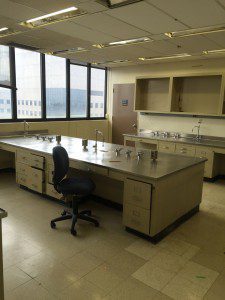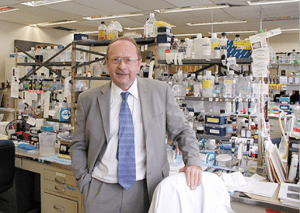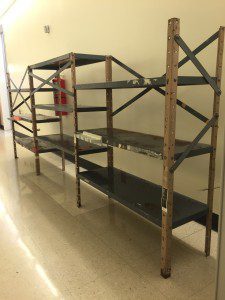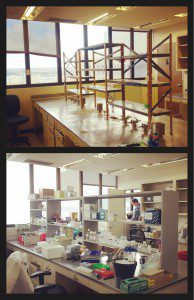

When I told Peter that his laboratory needed shelves, he told me to get them. I looked in the yellow pages (there was no internet at the time) and found a dealer in downtown Manhattan. When I told Peter, he responded, to my amazement, that he would drive me there to get them.
Within minutes we were in Peter’s car, driving far downtown to a small garage filled with shelf parts. The proprietor loaded some into Peter’s car and we returned to Mt. Sinai, where we carried the metal pieces up the elevator into the laboratory. There I bolted them together and made one set of shelving for the low lab bench, and a second set for a higher bench. The photo of Peter shows what the shelves looked like just a few years ago.

A few days ago Matt Evans, a professor in the same department as Peter, told me that the Palese lab was being renovated and that the shelves that I had built were being discarded. He knew that I had made the shelves because I talk about them when I give a seminar. Matt was kind enough to send photos of the shelves, and of the low lab bench on which they once rested. It’s amazing that the shelves lasted for 39 years!
There is a reason why I’m writing this story, and why I tell it whenever I give a seminar. I had selected Peter to be my Ph.D. mentor, which meant that I listened to him. When he told me to build the shelves, I built them. When I went to David Baltimore’s laboratory as a postdoctoral fellow, I listened to David. When either Peter or David asked me to do something, I did it. I selected them as mentors because they had more experience in virology than I had and I wanted to train with them. Therefore when they asked me to jump, I said, ‘how high’?


I have been very lucky to have trained many fine virologists during my 33 years at Columbia University. Most have listened to my suggestions. The best have always asked questions, leading to many wonderful two-way interactions. But some chose to consistently ignore my suggestions for experiments or projects. I have seen similar conduct in other laboratories here and elsewhere. This behavior baffles me. To this day, if Peter or David asked me to do something, I would immediately comply. They will always be my mentors.



These shelves look like the shelves I had in my lab in Rio.
Pingback: ACI Interview with Professor & Scholarly Blogger Dr. Vincent Racaniello | ACI